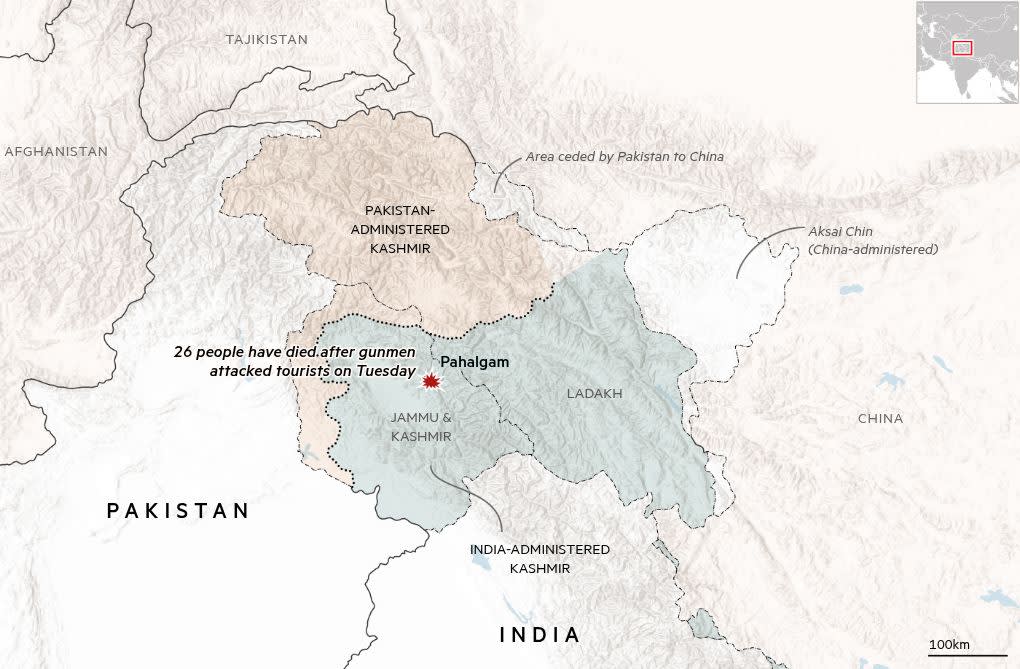Unlock the Editor’s Digest for free
Roula Khalaf, Editor of the FT, selects her favourite stories in this weekly newsletter.
India has sharply downgraded diplomatic relations with Pakistan and suspended its participation in a crucial cross-border water treaty, accusing Islamabad of being involved in a deadly attack on tourists in the disputed northern region of Kashmir.
The moves, which also included new travel restrictions, came after Prime Minister Narendra Modi convened senior ministers on Wednesday to decide how to respond to Tuesday’s killing by suspected militants of 26 tourists in the India-controlled territory of Jammu and Kashmir.
At the meeting, the “cross-border linkages of the terrorist attack were brought out”, India’s foreign secretary Vikram Misri told a news briefing without giving details of Pakistan’s alleged role.
Misri said the senior cabinet ministers had decided the Indus Waters Treaty of 1960, which governs the use by the two countries of water resources in the Indus river system, would be held in “abeyance . . . until Pakistan credibly and irrevocably abjures support for cross-border terrorism”.
The foreign minister said Pakistani military advisers would be expelled from diplomatic missions in India, Indian advisers withdrawn from Pakistan, and the overall number of diplomats in each country cut to 30 from 55. Pakistani nationals in India on special visas would have to return home.
Indian defence minister Rajnath Singh had already vowed on Wednesday to deliver a “very loud response” to those behind the attack, fanning expectations of a confrontation with the country’s nuclear-armed neighbour.
“We will not only reach those who perpetrated this act, we will even reach those who, sitting behind the scenes, conspired to carry out such nefarious activities on Indian soil,” Singh told a conference in New Delhi.
Singh did not explicitly mention Pakistan, but New Delhi has long accused Islamabad of supporting terrorism in Jammu and Kashmir and has previously staged military strikes on its neighbour in response to militant attacks in the territory.
The foreign ministry said the 26 tourists killed in the tourist destination of Pahalgam included one foreign national, a Nepali. Police said 17 others had been injured. It was the deadliest attack in Jammu and Kashmir in years and the worst against visitors to the region in decades.
“India is such an old civilisation and such a large country that it cannot be scared in any way by any such terrorist activities,” Singh told the conference. “Those responsible for such actions will witness a very loud response, very soon.”
It was not immediately clear who was responsible, but the attack prompted immediate and widespread calls in India for retaliation against Pakistan. Hindu groups and members of Modi’s Bharatiya Janata party rallied in Jammu on Wednesday, with chants that included “Pakistan will be removed from the map”.
Pakistan’s foreign ministry did not immediately comment on India’s allegations of involvement, saying in a statement on Wednesday only that it was “concerned at the loss of tourists’ lives in an attack in Anantnag district of Indian Illegally Occupied Jammu and Kashmir”.
“We extend our condolences to the near ones of the deceased and wish the injured a speedy recovery,” the ministry said.
But Pakistan power minister Awais Leghari denounced India’s suspension of participation in the Indus treaty as “an act of water warfare; a cowardly, illegal move”.
“Every drop is ours by right, and we will defend it with full force — legally, politically, and globally,” Leghari wrote in a post on social media platform X.
Shama Mohamed, a spokesperson for the opposition Indian National Congress, wrote on X that Rawalpindi, headquarters of Pakistan’s military, “should be flattened”.
“No more trade, no more cricket, no more cultural activities. Time to teach Pakistan a lesson they don’t forget,” she wrote.
Tensions between New Delhi and Islamabad had already been raised before the Pahalgam attack when Pakistan’s army chief General Asim Munir referred last week to Kashmir as “our jugular vein”.
“We will not leave our Kashmiri brothers in their heroic struggle,” Munir said in remarks that caused alarm in India.
India and Pakistan have been estranged since independence in 1947 and had already downgraded diplomatic and commercial ties in 2019 after New Delhi stripped Jammu and Kashmir of its constitutional autonomy.
Tuesday’s assault was a setback for Modi’s government, which has claimed to have brought peace since it reduced what was India’s only Muslim-majority state to a territory under direct federal rule.
The attack was the deadliest in the region since a 2019 suicide bombing when 40 Indian paramilitaries were killed and India was prompted to launch an air strike inside Pakistan on what it said was a terrorist training camp.
“This is a major, major incident,” Deependra Hooda, a retired general formerly responsible for India’s Northern Command, which includes Jammu and Kashmir, said of Tuesday’s attack.
In a post on Truth Social on Tuesday, US President Donald Trump said the news from Kashmir was “deeply disturbing”. “The United States stands strong with India against Terrorism,” he wrote.



